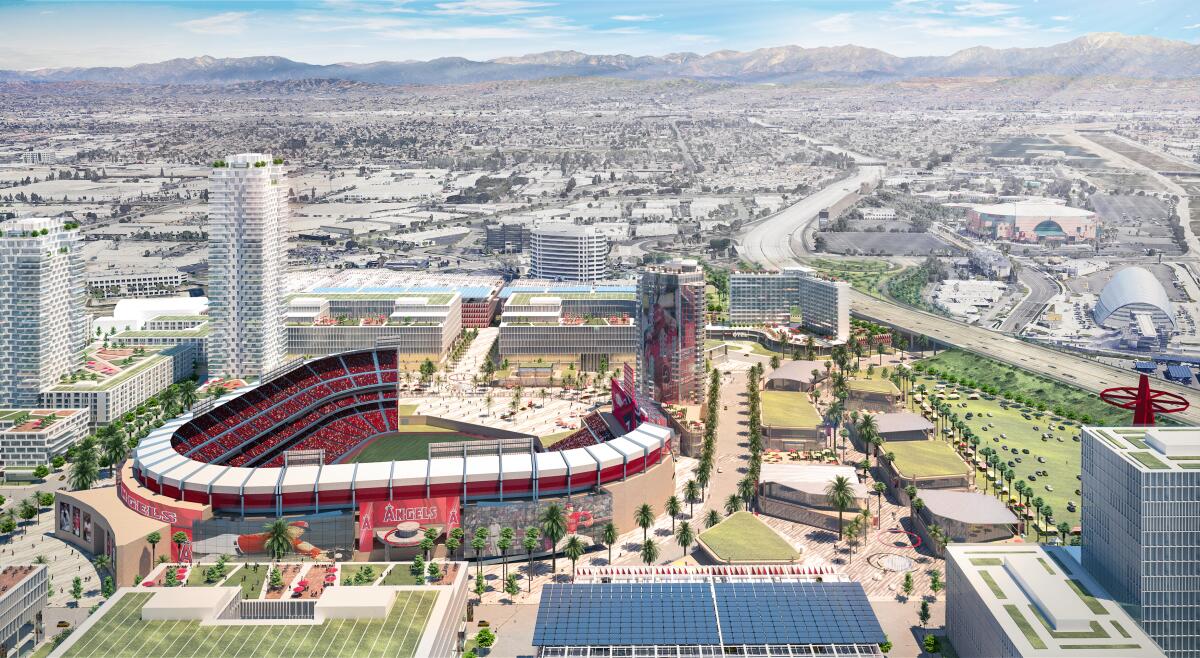Angel Stadium land sale clears final hurdle with housing agency settlement

- Share via
The final hurdle in the Angel Stadium land sale has been cleared.
The city of Anaheim and the state housing agency have reached a settlement over the city’s violation of California affordable housing law, two people familiar with the matter told The Los Angeles Times on Friday.
The people spoke on condition of anonymity because the settlement has not been publicly announced and its terms have not been disclosed.
Mike Lyster, spokesman for the city of Anaheim, said Friday he had “nothing to share at this time.” A spokesperson for the state housing agency did not immediately return a message seeking comment.
The Angel Stadium land sale moved a big step closer to completion after a judge ruled the city of Anaheim did not violate the state’s transparency law.
If the settlement is added to the agenda for the next City Council meeting, the council could ratify the settlement on Tuesday.
However, three years after the city agreed to sell Angel Stadium and the surrounding parking lots to Angels owner Arte Moreno and his development company, the deal can proceed without any legal obstacles.
The other major hurdle was cleared last month, when an Orange County Superior Court judge ruled the city had not violated the Brown Act — the state’s government transparency law — in negotiating the sale. The citizens’ group that sued the city filed no objection to the ruling and does not appear to have filed a notice of appeal. Kelly Aviles, the attorney representing the group, did not return a message late Friday.
Under the development plan, Moreno’s company would turn the 150-acre stadium site into a mini-city by building homes, shops, restaurants, hotels and offices on what is now a sea of parking lots surrounding Angel Stadium.

The team would remain in Anaheim through at least 2050, and Moreno could decide whether to renovate the current ballpark or build a new one.
The California Department of Housing and Community Development found the city in violation of the Surplus Land Act, which calls for public land put up for sale to first be offered to affordable housing developers. The city insisted it had not violated the law, claiming the land should not be considered surplus since the Angels are playing on it and noting that 15% of the housing units in the development plan would be classified as affordable.
In a settlement, the city could face a fine of about $96 million, which could be committed toward affordable housing elsewhere in Anaheim. The state can fine a city 30% of the sale price of a deal found in violation of the Surplus Land Act.
Major League Baseball’s chief revenue officer discusses the league’s decision to add Apple TV+ to its growing menu of streaming and broadcast options.
If that is indeed the fine, Anaheim still could say it negotiated the largest expansion of affordable housing in the city’s history and preserved an Angel Stadium deal projected to add $652 million to city coffers over 30 years, according to an economic impact study commissioned by Moreno. The city’s consultants reviewed and backed that study; Anaheim did not commission its own study.
However, of a purchase price originally announced at $325 million, Anaheim could end up with $54 million in cash, with $266 million in credits and fines allocated toward the development of affordable housing and parkland.
The remaining $5 million was subtracted from the price so Anaheim could retain land for a fire station and water well.
More to Read
Go beyond the scoreboard
Get the latest on L.A.'s teams in the daily Sports Report newsletter.
You may occasionally receive promotional content from the Los Angeles Times.








